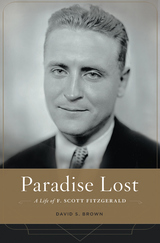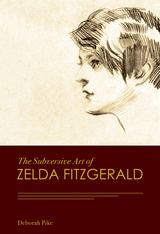
Pigeonholed in popular memory as a Jazz Age epicurean, a playboy, and an emblem of the Lost Generation, F. Scott Fitzgerald was at heart a moralist struck by the nation’s shifting mood and manners after World War I. In Paradise Lost, David Brown contends that Fitzgerald’s deepest allegiances were to a fading antebellum world he associated with his father’s Chesapeake Bay roots. Yet as a midwesterner, an Irish Catholic, and a perpetually in-debt author, he felt like an outsider in the haute bourgeoisie haunts of Lake Forest, Princeton, and Hollywood—places that left an indelible mark on his worldview.
In this comprehensive biography, Brown reexamines Fitzgerald’s childhood, first loves, and difficult marriage to Zelda Sayre. He looks at Fitzgerald’s friendship with Hemingway, the golden years that culminated with Gatsby, and his increasing alcohol abuse and declining fortunes which coincided with Zelda’s institutionalization and the nation’s economic collapse.
Placing Fitzgerald in the company of Progressive intellectuals such as Charles Beard, Randolph Bourne, and Thorstein Veblen, Brown reveals Fitzgerald as a writer with an encompassing historical imagination not suggested by his reputation as “the chronicler of the Jazz Age.” His best novels, stories, and essays take the measure of both the immediate moment and the more distant rhythms of capital accumulation, immigration, and sexual politics that were moving America further away from its Protestant agrarian moorings. Fitzgerald wrote powerfully about change in America, Brown shows, because he saw it as the dominant theme in his own family history and life.

This book gives light to the multiple artistic expressions of Great Gatsby-writer’s wife as modernist vanguard.
Known as an icon of the Jazz Age, a flamboyant socialite, and the mad wife of F. Scott, Zelda Fitzgerald has inspired studies of her life and work which focus on her earlier years, and on the myth of the glorious-but-doomed woman. As an unprecedented study of the totality Zelda Fitzgerald’s creative work, this book makes an important contribution to the history of women’s art with new perspectives on women and modernity, plagiarism, creative partnership, and the nature of mental illness.
Zelda Fitzgerald’s creative output was astonishing, considering the conditions under which she lived, and the brevity of her life: she wrote dozens of short stories, several journalistic pieces, a play, two novels, hundreds of letters, kept diaries and produced hundreds of artworks. Employing a new mode of literary analysis that draws upon critics, theorists, and historians to situate her work in its context, The Subversive Art of Zelda Fitzgerald rehabilitates the literary and artistic status of Zelda Fitzgerald by reassessing her life and writings in the light of archival sources. Such materials include medical and psychiatric documents; her unpublished novel; an artistic and spiritual diary; and over one hundred letters written from asylums.
While much of her writing can be read as a tactical response to her husband’s injunctions against her creativity, it can also be read as brilliant work in its own right. Far from imitating Scott’s style, Zelda Fitzgerald’s artistic output is vibrantly alive and utterly her own.
READERS
Browse our collection.
PUBLISHERS
See BiblioVault's publisher services.
STUDENT SERVICES
Files for college accessibility offices.
UChicago Accessibility Resources
home | accessibility | search | about | contact us
BiblioVault ® 2001 - 2024
The University of Chicago Press









